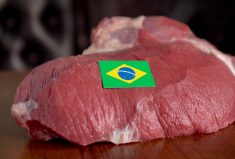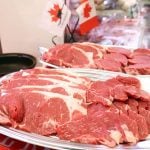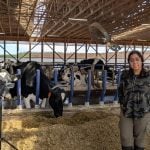Winnipeg/Chicago | Reuters — Canadian dairy farmers want trade negotiators to keep their hands off the protected sector in increasingly contentious talks with the United States, however loudly U.S. President Donald Trump demands greater access, an executive with Canada’s biggest dairy lobby group said Monday.
The sector, worth $21 billion in farm and processed dairy shipment sales, is the target of blistering verbal attacks and Twitter posts from Trump who complains that Canada’s tariffs, as high as 314 per cent, are unfair to the U.S.
Read Also

Mexico agriculture secretary says still no date for restarting cattle exports to U.S.
Mexican Agriculture Minister Julio Berdegue said on Wednesday that Mexico and the United States have not yet set a date to resume Mexican cattle exports amid an outbreak of the flesh-eating screwworm parasite.
Dairy has emerged as the latest flashpoint between the U.S. and Canada as they renegotiate the 1994 North American Free Trade Agreement. Trump’s attacks accelerated leading up to the weekend Group of Seven summit in Quebec, which ended with Trump withdrawing U.S. support for the G7’s communique and criticizing Prime Minister Justin Trudeau.
Dairy “should be off the table for these negotiations,” David Wiens, a Manitoba dairy farmer and vice-president of Dairy Farmers of Canada (DFC), said of NAFTA talks.
Canada’s 11,000 dairy farmers are concentrated in vote-rich provinces Quebec and Ontario, giving the industry outsized influence in domestic politics.
In recent trade deals with the European Union and a group of Asia-Pacific nations, Canada conceded larger tariff-free dairy quotas.
But DFC’s stance that it is unwilling to support more concessions may not be reaching politicians.
Trudeau said last week on NBC TV’s Meet the Press that Canada had “flexibility” on dairy, while U.S. Agriculture Secretary Sonny Perdue told U.S. Farm Report that Canada offered dairy concessions that were insufficient.
Trudeau was scheduled to meet with DFC on Monday, while Perdue is scheduled to visit federal Agriculture Minister Lawrence MacAulay at the latter’s farm on Prince Edward Island on Friday to discuss “opportunities for further co-operation” in agriculture.
Ten per cent of the Canadian dairy market is open to imports, with the rest effectively blocked by massive tariffs. Since the 1970s, Canada has controlled supplies of dairy, poultry and eggs to match domestic consumption, and prices are set by a government corporation and provincial boards.
DFC’s Wiens said giving up further market share would “make it very difficult for us to continue the growth and investment we’ve seen in the past several years. Opening to the U.S. market would be devastating.”
The U.S. Dairy Export Council reported the value of U.S. dairy exports in 2016 as US$4.8 billion.
Processors and farmers would be less likely to modernize operations, Wiens said.
With enough concessions, the value of farmers’ production quotas, worth about $25,000 per cow, could fall as other countries gain market share, said Mike Gifford, a retired government official who was Canada’s agriculture trade negotiator on NAFTA.
Canada will have to make dairy concessions to get a U.S. trade deal, but it does not have to mean dismantling supply management, Gifford said.
“If you’re a negotiator you have to know what’s sensitive for the other guy and what does the other guy need to get in order to say there’s a win-win outcome,” Gifford said.
The U.S. has its own protected sectors, such as sugar. Dairy is sensitive because the U.S. produces too much milk for a saturated global market, DFC president Pierre Lampron said in a statement.
Albert Kamps, a dairy producer and vice-chairman of Alberta Milk, said U.S. dairy farms “are overproducing and want to dump their oversupply in Canada but we’re full.”
Compared to Canada’s tariff-free import allowances, the U.S. “only allows three per cent tariff-free, but we’re labeled as the bad guys,” Kamps said in a separate release.
The U.S. is not seeking dismantlement of supply management, just greater access and the end of a Canadian system of pricing milk protein ingredients that is undercutting global prices, said Tom Vilsack, chief executive of the U.S. Dairy Export Council and a former U.S. agriculture secretary.
“They can continue to have a supply management system, but they can’t have the incredibly high tariffs and other barriers and maneuvers that they do to deal with the problems that are created by the supply management system,” Vilsack said.
But Gregg Doud, the chief agricultural negotiator in the Office of the U.S. Trade Representative, told Reuters on Thursday that the U.S. has “very serious concerns about the subsidies and the structure of Canada’s dairy industry.”
— Reporting for Reuters by Rod Nickel in Winnipeg and Julie Ingwersen in Chicago; additional reporting by Tom Polansek in Chicago. Includes files from AGCanada.com Network staff.












